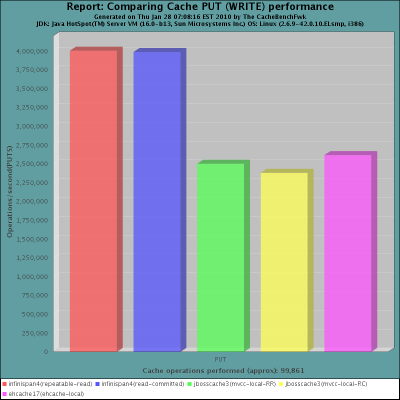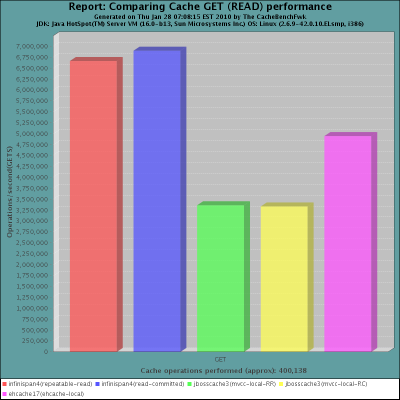<infinispan/>
Introduction
Even though Infinispan's biggest potential is as distributed, in-memory data grid platform, one aspect of it often gets overlooked - it can be used as a standalone cache node. But why would anyone use Infinispan over, say, a ConcurrentHashMap? Here are some reasons:
__
-
Eviction. Built-in eviction ensures you don't run out of memory.
-
Write-through and write-behind caching. Going beyond memory and onto disk (or any other pluggable CacheStore) means that your state survives restarts, and preloaded hot caches can be configured.
-
JTA support and XA compliance. Participate in ongoing transactions with any JTA-compliant transaction manager.
-
MVCC-based concurrency. Highly optimized for fast, non-blocking readers.
-
Manageability. Simple JMX or rich GUI management console via JOPR, you have a choice.
-
Not just for the JVM. RESTful API, and upcoming client/server modules speaking Memcached and HotRodprotocols help non-JVM platforms use Infinispan.
-
Cluster-ready. Should the need arise.
__
So how do you get started with Infinispan in local mode? The simplest configuration file containing just
is enough to get you started, or you can create DefaultCacheManager with no -argument constructor. Either approach creates local default cache.
All the features above are exposed via an easy-to-use Cache interface, which extends ConcurrentMap and is compatible with many other cache systems. Infinispan even ships with migration tools to help you move off other cache solutions onto Infinispan, whether you need a cache to store data retrieved remotely or simply as a 2nd level cache for Hibernate.
Performance
In the process of testing and tuning Infinispan on very large clusters, we have started to put together a benchmarking framework. As a part of this framework, we have the ability to measure cache performance in standalone, local mode. We compared Infinispan 4.0 in local mode against the latest JBoss Cache release (3.2.2.GA) and EHCache (1.7.2). Some background on the tests:
-
Used a latest snapshot of the CacheBenchFwk
-
Run on a RHEL 5 server with 4 Intel Xeon cores, 4GB of RAM
-
Sun JDK 1.6.0_18, with -Xms1g -Xmx1g
-
Test run on a single node, with 25 concurrent threads, using randomly generated Strings as keys and values and a 1kb payload for each entry, with a 80/20 read/write ratio.
-
Performance measured in transactions per second (higher = better).


In summary, what we have here is that when run in local mode, Infinispan is a high-performance standalone caching engine which offers a rich set of features while still being trivially simple to configure and use.